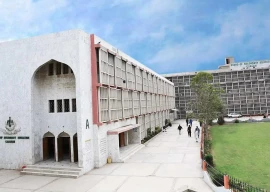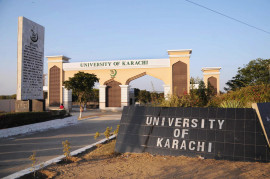
Khar had studied economics during her time at the Lahore based business school, and she shared with students how her studies were now helping her in the day to day life as a foreign minister. "Everything now is increasingly moving towards economic diplomacy so having a basic understanding of the subject has done me good.”
Afghanistan
But soon the mood turned to serious matters. Speaking on Afghanistan, Khar regretted that over the years Pakistan had not concentrated on a 'prosperous neighbourhod' and said that ties with neighboring countries including Afghanistan, was in Pakistan's interest and that peaceful ties should be established with all its neighbors. Responding to a question about Pakistan's role in the Afghan reconciliation process, Khar said the 'if asked' to be a party to the Afghan led reconciliatory process, Pakistan will assist in whatever capacity possible.
She added that a 'spill out' affect of the instability in neighbouring countries would adversely affect the entire region.
Offering a simplistic solution to problems of diplomatic nature, Khar said that the 'is it in Pakistan's interest?' question often offered easy solutions to the issues at hand. “In pursuing its goals and objectives, Pakistan wants to be a responsible global player,” she said.
US
Talking about Pakistan-US relations, which have sunk to their lowest in the aftermath of the Nato Salala checkpost raid, the foreign minister said, “the relationship with the US is very dear to Pakistan but not at the cost of its sovereignty.”
Commenting on drone attacks, one of which blew up a school in North Waziristan on Sunday, and has been a source of anger among many Pakistanis, she termed it as a "complex problem," and that all diplomatic means were being utilised to address the issue.
Looking at a way forward, she hoped that ties with US will be based on common interests of both the countries, “long term relations with any super power can only be assured if it is based on mutual interest and respect.”
Referring to the recent visit of US special envoy for Afghanistan and Pakistan Marc Grossman and his meeting with the Chief of Army Staff General Ashfaq Parvez Kayani, Khar said that there was "nothing wrong" about the nature of the meeting.
“There is a lot of ‘security element’ in our relationship with the US,” said Khar, clarifying that the meeting should not attract any undue concern, adding that every institution in Pakistan was a stakeholder, including the GHQ.
“We (the government) are in an evolutionary phase and rest assured that every institution is in its right place,” said Khar.
Siachen
The Siachen issue was also addressed in the minister’s speech, saying that there can be no unilateral withdrawal of troops from Siachen. Khar added that the emphasis lay not merely on troop withdrawal, but an environment of mutual trust between the two countries was also needed.
Kashmir
Talking about Kashmir, Khar said it still remained a core issue that posed hurdles in improving ties between India and Pakistan and that it was time to ascertain whether the issue could be resolved militarily or at the dialogue table, “if not resolved, the Kashmir issue will continue to breed hatred among the people.”
Iran-Pakistan pipeline
Speaking about the proposed Iran-Pakistan gas pipeline, Khar said that Pakistan could not afford to be selective in relations with its neighbours based on its energy demands.
GB, Balochistan
Regarding the recent spate of violence in Gilgit-Baltistan and Balochistan, she said that it remained a matter of great concern for the government.
Talking about about the role of foreign elements in Balochistan, Khar stated that the Prime Minister had raised the issue with India’s Prime Minister Manmohan Singh during a meeting between the two in Sharm el-Sheikh, adding that while Pakistan faced 'external conspiracies', it was necessary for it to become strong internally, to resist the external elements.
Responding to a question regarding resumption of cricketing tie between Pakistan and India, she said much was being done to address the issue diplomatically on both sides.
COMMENTS (5)
Comments are moderated and generally will be posted if they are on-topic and not abusive.
For more information, please see our Comments FAQ





1732947071-0/BeFunk_§_]__§-(4)1732947071-0.jpg)











@ dude above
Simple answer to your concerns. We do not live in an isolated world and whatever happens around us effects us. Hence, the foreign policy needs to take all such things in account.
Dear Hina:
Dear Hina:
Every sitting Foreign Minister of Pakistan is toeing the same policy which was toed by the predecessors.
After the independence, Pakistan at local and foreign forums has highlighted the issue of Kashmir but even after a lapse of 65 years, the Kashmir issue remains unresolved?
What has Kashmir given to Pakistan?
Deaths of uncounted precious human lives and destruction of properties, interference of RAW, terrorism from across the border and involvement of Indian Army, cessation of former East Pakistan and creation of Bangladesh in 1971.
And what Afghanistan has given to Pakistan?
Hundreds of thousand of illegal migrants most of them have now become of citizens of Pakistan.
Dope and Kalashnikov culture, terrorism from across the border.
And what US has given to Pakistan?
Drone attacks after 9/11, unending war on terror, suicide blasts in which uncounted innocent people have been killed, terrorism and above all deceiving the government and people of Pakistan.
What sort of foreign policy you are in the making?
Why Pakistan was unable to protect its sovereignty, integrity and self respect in the world despite giving all sorts of help to US and cooperation to Afghanistan.
Why can’t we make our own foreign policy and without considering what will be the outcome of Kashmir, Afghanistan and relations with USA.
How long are we going play in the hands of foreign powers against the wishes of the nation?
If a Foreign Minister of Pakistan fails to pursue its policies, it means that Pakistan has failed in progressing further.
"Talking about Kashmir, Khar said it still remained a core issue that posed hurdles in improving ties between India and Pakistan and that it was time to ascertain whether the issue could be resolved militarily or at the dialogue table, “if not resolved, the Kashmir issue will continue to breed hatred among the people.”
Pakistan is the revisionist power not India. India has not used military to resolve Kashmir in the past and will not in the future. Pakistan HAS tried to use it in the past in 1965 and 99 and not been successful. So what is left to be ascertained as to whether military option can be used?As for continuing to breed hatred, it is really a decision taken by Pakistan. If the establishment decides to continue breeding hatred, even if Kashmir is solved a different issue will be teed up example falsely accusing India of water terrorism when all independent arbitrators have indicated that India has not breached Indus Water Treaty. If Pakistan wanted the hate to subside it could have easily done so by not allowing anti-India and anti-Hindu hate to be preached in n mosques and public meeting, by not allowing that to be taught in school. After all 60% of Pak population is less than 30 years i.e. born in 1982 or later. They and most likely even their parents were not born at time of partition and there is no reason for them to be hatefilled unless the hate is deliberatley reinforced.
WOW!!!!! Why do all good things happen at LUMS.
Why can't other universities learn from LUMS. This is the type of events that we need in all universities. Not just slogans but real educated discussion on these serious issues. I am from GCU and had gone to the talk and really loved the atmosphere and the way the LUMS VC conducted it. It still do not agree with Hina Khar's party but I was impressed by her today.